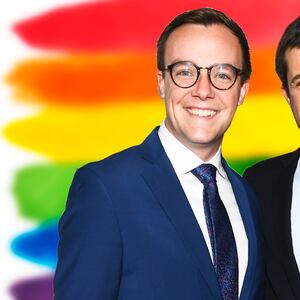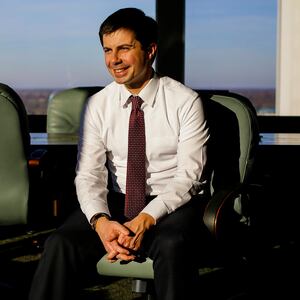He makes jokes about Grindr. He embraces his husband in public. He talks about coming out. It’s no surprise that Pete Buttigieg, the Democratic candidate running to be the first openly gay U.S. president, has earned support from across the LGBTQ spectrum. But for some queer women, the primary star is just another white man running for president.
With a record six women running in 2020, and Hillary Clinton’s bitter defeat still fresh on their tongues, a number of LGBTQ women told The Daily Beast they would simply prefer a female candidate.
“For me, being queer or lesbian, nominating a young, inexperienced white gay man is not my priority,” Duke University Prof. Ara Wilson told The Daily Beast. “The fact that we have not had women in that high office is, to me, much more marked, much more dramatic, and much more moving.”
ADVERTISEMENT
For some, the feeling is personal. Sue Hagadorn, a former software manager from Michigan, said she felt her gender had always held her back more than her sexual orientation did—particularly in her career. In her 25 years of being out in the workplace, she said, “I never had significant difficulty in the workplace because I was gay. But boy did I ever—like all women—because I was female.”
“I feel that misogyny is a much more serious force in the country, right now especially, than homophobia—particularly homophobia that is directed at people like Pete and me,” she added, referring to white, cisgender queer people.
Others were more concerned about Buttigieg’s bona fides as a candidate. For all that has been made about his military service (eight years in the Navy Reserve), prestigious education (degrees from both Harvard and Oxford), and intellectualism (he speaks eight languages), Buttigieg’s only political experience is two terms as mayor of South Bend—the fourth-largest city in Indiana.
“I just don’t think a mayor of a small town in Indiana is prepared to become president of the United States,” said Columbia University Prof. Tanya Domi, herself a veteran and Indiana native.
“I don’t care if he’s gay and I don’t care if he served in the military,” she added. “I just couldn’t bring myself to support somebody [like Buttigieg] when we have several women who are highly qualified U.S. senators and one woman who’s in the House.”
That idea—that Buttigieg is stealing the thunder of more qualified women—was a frequent source of concern. In the last week alone, Buttigieg has netted a New York magazine cover story, Politico magazine profile, and front page story in The New York Times. Kamala Harris, meanwhile—the only black woman in the race and the second-most successful fundraiser—has garnered exactly zero magazine covers for her run.
Wilson argued that Buttigieg’s stratospheric rise to prominence shows he is part of a privileged class in American politics, regardless of his sexual orientation.
“It’s unthinkable that a lesbian of color—or just a lesbian—could garner that same support based on his experience,” Wilson said. “The fact that a gay man is running is less significant than the fact that white men are granted the latitude to take themselves seriously enough as a candidate for the leading office in this country when they have very little political experience.”
The women’s concerns will be familiar to anyone living with two marginalized identities at once—an experience known in internet parlance as “intersectionality.” Simply put, living as a queer woman, a queer woman of color, or even a queer man of color, is markedly different than living as an educated, cisgender, well-dressed, white gay man.
“In my 5 years of research, I have found that linguistically, ‘gay’ codes as white male & ‘queer’ codes as Black queer/trans, femme queer, lesbian AND poor, marginalized & left,” writer and doctoral candidate Steven Thrasher wrote in a viral tweet thread this week. “I think Buttigieg is going to be another plot point in which we see white gay men pull away from queer people.”
The history of being both female and queer is full of challenges, whether lesbians and bi women were being ousted from feminist organizations or fighting to be included in gay history books. Even today, queer women earn less than their male counterparts and are more likely to live in poverty. According to Lambda Legal, queer women are also more likely than men to report being treated differently by their healthcare providers, and to encounter a provider who doesn’t understand their specific needs. Both wage and healthcare discrimination are even more marked for trans women and queer women of color.
Queer women may prefer female candidates simply because they are more likely to address these issues. Sens. Elizabeth Warren and Kirsten Gillibrand, for example, have debuted paid family-leave plans, while Harris has already introduced legislation to target the high maternal mortality rate for black women. Sen. Amy Klobuchar co-sponsored the Paycheck Fairness Act in 2014 and the Lilly Ledbetter Fair Pay Act in 2009.
Buttigieg has addressed the limits of his race and gender identity in the past, telling Ebony magazine that “as a member of one minority community, it doesn’t mean that I personally understand the experience of others.”
“I have no idea what it is like personally, what it is like to be a transgender woman of color, but I know that I need to stand up for her, just as others have stood up for me,” he said, adding that Americans should “use our identity as a source of solidarity.”
But Buttigieg has also faced criticism for policies affecting people of color, including his advocacy for projects in South Bend that some feel gentrified the city. The mayor was recently taken to task for a 2015 speech on police brutality in which he said that “all lives matter.” (Buttigieg claims these comments were made before the phrase was weaponized against the Black Lives Matter movement.)
That history makes Buttigieg’s campaign even more fraught for queer women of color. Rooney Wynn, a black, queer woman from North Carolina, tweeted earlier this week that she “will not be excited about any white man,” calling candidates like Bernie Sanders, Beto O’Rourke, and Buttigieg “boring” and “basic.” But in an interview with The Daily Beast, Wynn explained the reality of her opinion was much more nuanced.
“I do like that he’s an openly gay man running for president,” she said. “But at the same time, I’m a black queer woman and sometimes it just gets a bit discouraging that the first person to open the way always has to be white.”
There are, of course, many queer women who support Buttigieg. Ellen DeGeneres—possibly the most well-known lesbian of her generation—hosted the mayor on her show and praised him on Twitter. (Rachel Maddow, a close runner-up for the most-visible-lesbian prize, also interviewed him on her prime-time program.) Annise Parker, president of the LGBTQ Victory Fund and an out former mayor, previously told The Daily Beast her organization was “excited about his candidacy—it’s clear that he’s ready for prime time.”
Even the women who spoke to The Daily Beast about their reservations said they were excited about having an openly LGBTQ person run for president.
“I’ve been around gay politics for a long time and of course it is gratifying to see a gay person being taken seriously for this election,” said Domi, a former board chair of LGBTQ rights organization GetEQUAL.
“But I do think there is going to be a split within the gay community. I think it is already happening.”
Buttigieg has promoted himself as a “change” candidate, similar to former President Barack Obama, not least because of his sexual orientation. He has repeatedly joked that he can’t think of anyone further from the current president than himself, and urged voters in his announcement speech to “walk… toward something totally different.” When USA Today asked him last month about whether being a “white cisgender male” automatically made him “part of the status quo,” Buttigieg responded: “If that’s the case, then that represents progress.”
But for many of the women who spoke to The Daily Beast, the fear seemed to be that the self-described “laid-back, intellectual, young, gay mayor from the Midwest” would still not be enough of a change.
“Yes, he would be the first gay president if he won and yes that’s amazing,” Wynn said. “But he is still a white man and he still is going to benefit from white privilege, he still is going to benefit from male privilege.”
“He is still in a lot of ways the same—not politically, not in sexual orientation—but in a lot of ways just more of the same,” she said.







